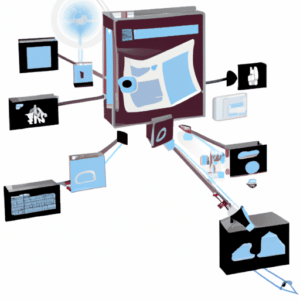What Are the Best Web3 Reports?
In this roundup, we’ll share the most comprehensive list of the best Web3 reports available online. If you’re interested in understanding Web3 and its potential impact on various industries, these 38 articles can help guide you through your learning journey.
1. Bitcoin, Blockchain, and the Energy Sector (Congressional Research Service)
This insightful report offers a comprehensive examination of the complex relationship between Bitcoin, blockchain technology, and the energy sector. It delves into how Bitcoin mining operations – which rely heavily on blockchain’s decentralized ledger systems – impact energy consumption and distribution.
Moreover, it scrutinizes how these technologies influence energy-sector innovations, such as the design and implementation of smart grids. The report is a valuable resource for those seeking a nuanced understanding of this unique intersection between the digital and energy economies.
2. Bitcoin: Questions, Answers, and Analysis of Legal Issues (Congressional Research Service)
This report seeks to demystify the legal complexities surrounding Bitcoin. It is a beneficial resource not only for legal professionals in the field of fintech but also for emerging cryptocurrency investors and blockchain enthusiasts.
The report comprehensively answers a broad array of questions ranging from Bitcoin’s legal status, its taxation, and its potential impact on global economic stability. The thorough analysis further delves into considerations for consumer protection, outlining potential legal issues related to fraudulent activities and regulatory compliance.
Therefore, this report stands as an essential guide for anyone seeking a deeper understanding of the legal landscape of Bitcoin.
3. Beyond Bitcoin: Emerging Applications for Blockchain Technology (Congressional Research Service)
This report delves into the extensive possibilities of blockchain technology beyond Bitcoin. It exposes readers to its potential utilization across a plethora of industries including, but not limited to, finance, healthcare, supply chain, and governance. Each of these sectors presents unique challenges that blockchain technology could address, such as data integrity in healthcare or supply chain transparency.
The report also explores how the adoption of this technology could revolutionize these sectors by streamlining processes, enhancing security, and fostering trust among participants.
Therefore, this report is a vital resource for anyone interested in exploring the diverse landscape of blockchain applications beyond cryptocurrency.
4. Blockchain and Associated Legal Issues for Emerging Markets (International Finance Corporation)
This report examines the intersection of law and technology in developing economies. It elucidates the potential legal challenges and regulatory hurdles that accompany the adoption of blockchain technology in these regions.
For stakeholders, policymakers, and business leaders operating in emerging markets, this report provides crucial insights into how to navigate the legal landscape associated with this disruptive technology. It also offers a comprehensive analysis of various legal frameworks and their potential impact on the adoption and implementation of blockchain technology.
Therefore, this report is a critical read for those keen to understand and navigate the complex legal terrains of emerging markets in the era of blockchain technology.
5. Blockchain and International Trade (Congressional Research Service)
This report delves into the multifaceted impact of blockchain technologies on the domain of international trade. It judiciously examines how these decentralized systems could revolutionize trade by improving efficiency, reducing costs, and enhancing transparency.
By mitigating the need for intermediaries, blockchain could streamline processes, enabling quicker and cheaper transactions. Furthermore, the inherent security features of blockchain technology could minimize fraud and counterfeiting in international trade.
However, the report also highlights potential challenges, such as regulatory concerns, technical issues, and the need for international cooperation and standardization.
It is therefore a must-read article for anyone interested in the crossroads of blockchain technology and international trade, offering a balanced perspective on the potential benefits and hurdles.
6. Blockchain Technology and Agriculture (Congressional Research Service)
This report examines how blockchain technology could bring about immense transformation to the agricultural sector by enhancing traceability, reducing inefficiencies, and promoting fair trade. Blockchain’s ability to establish a secure, immutable record of transactions, from farm to table, can improve supply chain transparency and consumer trust. It can also minimize the risk of food fraud and strengthen recall processes in the event of food safety issues.
Furthermore, blockchain’s potential to automate payments and contracts through smart contracts could reduce administrative costs and deliver a more equitable distribution of profits among farmers.
However, similar to other sectors, the adoption of blockchain in agriculture is not without challenges. Issues related to data privacy, the digital divide, and the need for a standardized regulatory framework all need to be addressed to fully harness the potential of this technology in agriculture.
7. Blockchain: Background and Policy Issues (Congressional Research Service)
This report provides an in-depth exploration of the intricacies of blockchain technology and the corresponding policy concerns it necessitates. As the technology continues to evolve and permeate various sectors, it inevitably raises both opportunities and challenges in policy-making.
This comprehensive guide delves into a variety of policy issues such as the need for regulation, the impact on the economy, data privacy and security, legal considerations, and the potential implications on trust and societal structures.
By providing an extensive background on blockchain, the report establishes a solid foundation for understanding the technology, enabling readers to appreciate the broader context within which blockchain operates and the consequential policy questions it provokes.
8. Blockchain: Emerging Technology Offers Benefits for Some Applications but Faces Challenges (Government Accountability Office)
This report provides a detailed examination of how blockchain technology can be harnessed to yield benefits across a multitude of applications, from facilitating high-security transactions to ensuring data integrity and transparency. It offers a valuable perspective, balancing the potential advantages of blockchain against the challenges that need to be addressed to unlock its full potential.
However, like all emerging technologies, blockchain is not without its set of challenges. This report lays out numerous potential obstacles, such as the technology’s significant energy consumption, the complexities associated with updating or rectifying blockchain data, and scalability issues that could limit its utility in high-volume contexts.
It also discusses concerns related to data privacy and the need for a robust regulatory framework to ensure that the technology is used ethically and responsibly.
9. Blockchain: Novel Provenance Applications (Congressional Research Service)
This report delves into the novel provenance applications of blockchain technology across various sectors, emphasizing its ability to boost transparency and foster trust. It explores how blockchain, as an immutable and decentralized ledger, can effectively track and authenticate the origin of goods, from agricultural products to luxury items, thus mitigating the risks of fraud, counterfeiting, and unethical practices.
Furthermore, the report highlights how blockchain’s provenance applications can help ensure accountability in supply chains, validate claims of sustainability, and even streamline the process of intellectual property rights management. It underscores the transformative potential of blockchain, though it also notes the importance of addressing associated technological and regulatory challenges for effective implementation.
10. Examining Regulatory Frameworks for Digital Currencies and Blockchain (Congressional Research Service)
This report serves as a valuable resource for those seeking to understand the regulatory landscape surrounding Web3 technologies. It offers a comprehensive overview of the existing regulations, highlighting inconsistencies, potential gaps, and areas that may benefit from policy refinement.
In addition, the report provides insights for a wide audience, including policymakers, regulators, and stakeholders such as businesses, individual investors, and consumers. It prompts a deeper examination of how to effectively regulate digital currencies and blockchain technology while encouraging innovation and growth, maintaining financial stability, and protecting consumers and investors.
Importantly, this report fosters informed discussions around the development of practical, forward-looking regulations for digital currencies and blockchain technology.
11. Bank Custody, Trust Banks, and Cryptocurrency (Congressional Research Service)
This report sheds light on the ways traditional banking systems, trust banks, and cryptocurrencies coexist, collaborate, and sometimes clash in today’s financial environment. It explores how traditional banking institutions are adapting to the rise of cryptocurrencies. Trust banks, which have unique roles and responsibilities, are examined for their potential to serve as a bridge between the conventional banking world and the burgeoning crypto ecosystem.
Furthermore, the report focuses on how these interactions can influence the trajectory of financial systems worldwide. It is an indispensable guide for anyone interested in the evolving dynamics among traditional banking, trust banks, and digital currencies.
12. Central Bank Digital Currencies: Policy Issues (Congressional Research Service)
This report discusses how the advent of digital currencies has introduced a paradigm shift in monetary systems, prompting many central banks worldwide to explore the potential of creating their own digital currencies.
Central Bank Digital Currencies (CBDCs), as these are generally known, represent a new frontier in the digital economy. They combine the convenience and security of digital forms like cryptocurrency with the regulated, reserve-backed money circulation of the traditional banking system.
As CBDCs potentially play a crucial role in future financial infrastructures, they present a range of policy issues. These span from technical challenges, like developing secure and scalable technologies, to legal and regulatory hurdles such as ensuring privacy, preventing digital fraud, and integrating with existing financial laws. Other considerations include the broader economic impacts like influence on monetary policy and financial stability.
In summary, this report ventures into an in-depth exploration of these complexities, aiming to demystify the policy issues surrounding CBDCs.
13. CFTC and Virtual Currencies: New Court Rulings and Implications for Congress (Congressional Research Service)
This report discusses the Commodity Futures Trading Commission’s (CFTC) potential role in the regulation of virtual currencies, such as Bitcoin, in the United States. As digital assets continue to gain traction, the judicial landscape surrounding them also evolves, often shaping the CFTC’s oversight and influence.
For instance, recent court rulings have affirmed the CFTC’s jurisdiction to prosecute fraud and manipulation in the virtual currency markets. These verdicts not only provide a platform for the CFTC to exercise its enforcement powers but also raise significant considerations for Congress. Specifically, they may prompt further legislative clarity on the CFTC’s scope and responsibilities related to virtual currencies, potentially shaping the future regulatory framework for this burgeoning sector.
14. Crypto-Asset Exchanges: Current Practices and Policy Issues (Congressional Research Service)
This report discusses how crypto-asset exchanges serve as the primary gateway for individuals and institutions looking to enter the world of cryptocurrencies. They facilitate the buying, selling, and trading of various crypto-assets, acting essentially as a marketplace for these digital commodities.
These platforms have evolved rapidly, with some offering advanced features such as futures trading, margin trading, and even decentralized finance (DeFi) options. However, along with the growth and development of these exchanges come significant policy issues. Regulatory oversight, consumer protection, and market integrity are key considerations.
The proliferation of these exchanges has raised concerns about money laundering and other illicit activities. Therefore, discussions around the best practices for crypto-asset exchanges and the policy issues that come with them are essential as we navigate the future of this digital frontier.
15. Cryptocurrency in 401(k) Retirement Plans (Congressional Research Service)
This report focuses on the inclusion of cryptocurrencies in 401(k) retirement plans. As a new asset class, cryptocurrencies like Bitcoin and Ethereum bring the potential for high returns, although they come with substantial risk due to their volatility. The inclusion of cryptocurrencies in retirement plans makes it possible for more people to invest in these digital assets over the long term, potentially leading to substantial growth over time.
However, the adoption is not without challenges. Questions around regulatory issues, market volatility, and security need to be thoroughly addressed to ensure that the incorporation of cryptocurrencies into 401(k) retirement plans aligns with the risk tolerance and retirement goals of individuals. Nevertheless, this development reflects the ongoing evolution and maturation of the cryptocurrency market.
16. Cryptocurrency Transfers and Data Collection (Congressional Research Service)
This report discusses the data collection processes involved in cryptocurrency transfers. These processes are not merely about recording transactional data. They extend to capturing intricate details tied to the identities involved, timestamping each transaction, and providing a transparent, immutable record of all cryptocurrency transfers.
The blockchain technology that underlies most cryptocurrencies fundamentally enables this level of comprehensive data collection, contributing to the security and transparency of the digital currency ecosystem. However, this also brings forth challenges concerning privacy and data security, as the immutability of blockchain records can potentially be a double-edged sword.
Therefore, understanding and navigating these complexities is crucial as we continue to explore the potential and pitfalls of cryptocurrency transfers and their associated data collection processes.
17. Cryptocurrency: The Economics of Money and Selected Policy Issues (Congressional Research Service)
This report delves into the economics of cryptocurrency, offering a comprehensive and nuanced perspective on the financial implications and policy considerations that come with this burgeoning form of digital currency. It provides insights into how cryptocurrencies operate within economic structures and the impact they could have on traditional financial systems.
Further, it addresses policy issues that arise with cryptocurrencies. These include regulatory challenges, potential risks to financial stability, and questions around consumer protection. As cryptocurrencies become more mainstream, these policy considerations will play a pivotal role in shaping the future of digital finance.
By exploring these aspects, the report underscores the complexity of integrating cryptocurrencies into the prevailing economic landscape.
18. Digital Assets and SEC Regulation (Congressical Research Service)
The report offers a comprehensive overview of the legalities surrounding digital currencies. As the regulatory body responsible for maintaining fair and orderly markets in the United States, the SEC’s role in regulating digital assets is crucial. The report delves into the intricacies of how the SEC determines if a digital asset qualifies as a security and the legal implications that follow. It also lays out the SEC’s views on Initial Coin Offerings (ICOs) and the safeguards put in place to protect investors in the digital asset marketplace.
Therefore, this document offers critical insights for anyone interested in understanding the legal framework that underlies the dynamic world of digital assets.
19. Digital Currencies: Sanctions Evasion Risks (Congressional Research Service)
The report provides a deep analysis of how digital currencies can be exploited as conduits for sanctions evasion. It brings to light the inherent anonymity attributes of these currencies that can present opportunities for rogue states, terrorists, and cybercriminals to bypass international sanctions.
Further, the report outlines how these actors can use digital currencies to facilitate illicit financial transactions, effectively escaping the radar of monitoring bodies. This presents a significant challenge to governing institutions, raising questions about the effectiveness and enforcement of global sanctions in the digital age.
The report also suggests potential strategies and policy measures that could be adopted to mitigate such evasion risks, while highlighting the necessity for international cooperation in tackling this emerging threat.
20. Financial Innovation: “Cryptocurrencies” (Congressional Research Service)
This report underscores how cryptocurrencies, as a form of financial innovation, are radically transforming the financial landscape. With their decentralized nature, these digital assets offer a peer-to-peer framework, eliminating the need for traditional intermediaries like banks.
In this report, the Congressional Research Service delves into the mechanics of cryptocurrencies, explaining the underlying technology, blockchain, that ensures their security and transparency. The report also explores the potential applications and implications of cryptocurrencies in various sectors of the economy, from payments and remittances to smart contracts and decentralized finance.
However, the report cautions about the possible risks and challenges associated with cryptocurrencies, such as price volatility, regulatory hurdles, and potential misuse for illicit activities. It emphasizes the need for ongoing research and a robust regulatory framework to harness the potential of cryptocurrencies while mitigating their risks.
21. Financial Innovation: Central Bank Digital Currencies (Congressional Research Service)
This report dives into the innovative world of CBDCs. It explores how they combine the efficiency and convenience of digital currencies with the regulatory oversight and stability of traditional money. It delves into the potential applications of CBDCs, such as streamlined payments, increased financial inclusion, and enhanced monetary policy effectiveness.
However, it also cautions about possible risks, including cybersecurity threats, privacy concerns, and potential impact on traditional banking. The report encourages further exploration and careful consideration of these aspects to balance the potential benefits and risks of CBDCs.
22. Financial Innovation: Digital Assets and Initial Coin Offerings (Congressional Research Service)
This report demystifies the complex world of digital assets and Initial Coin Offerings (ICOs). Digital assets, encompassing cryptocurrencies, utility tokens, and asset tokens, are transforming the landscape of financial transactions and investments. Initial Coin Offerings (ICOs), on the other hand, have emerged as an innovative fundraising mechanism, enabling startups to bypass traditional funding routes and directly reach potential investors worldwide.
However, the report also underlines the inherent risks and regulatory challenges associated with these digital innovations, such as potential fraud, lack of investor protection, and market manipulation. It advocates for informed policymaking and a balanced regulatory approach to ensure the safe and beneficial evolution of these financial innovations.
23. How the Lummis-Gillibrand Responsible Financial Innovation Act (S. 4356) Would Alter the Crypto Regulatory Landscape (Congressional Research Service)
The Lummis-Gillibrand Responsible Financial Innovation Act, as highlighted in this report, holds the potential to significantly alter the regulatory landscape of cryptocurrencies. The Act aims to provide a comprehensive regulatory framework that manages the risks associated with digital currencies while also promoting innovation. It emphasizes the importance of financial literacy and investor protection in the rapidly evolving digital currency space.
The Act also proposes the creation of a digital asset working group, bringing together representatives from diverse fields to provide informed perspectives and insights. The report suggests that the proposed regulatory changes could provide clarity to businesses and investors, thus fostering a secure and growth-oriented environment for digital currencies.
24. International Approaches to Digital Currencies (Congressional Research Service)
This report highlights the global response to the rise of digital currencies. This response has been diverse and multi-faceted, reflecting the complex implications these innovative technologies bring to the financial sector. Countries around the world are grappling to understand and regulate digital currencies, each adopting a unique approach tailored to their specific economic, social, and regulatory contexts.
For instance, some nations have embraced the disruptive potential of these currencies, fostering an environment conducive to experimentation and growth. Others, concerned about potential risks such as financial instability and illicit activities, have adopted a more cautious approach, putting in place stringent regulatory measures. This diversity of approaches underscores the dynamic and evolving nature of the digital currency landscape and the ongoing challenges regulators face in balancing the twin goals of fostering innovation and ensuring financial security.
25. Libra: A Facebook-led Cryptocurrency Initiative (Congressional Research Service)
This report discusses how Facebook’s Libra project represents a significant and controversial development in the digital currency sector. Launched to create a universal, stable currency that transcends national boundaries, Libra holds the potential to drastically change the global financial landscape. By integrating directly with Facebook’s vast user network, Libra could enable a new form of online commerce and financial integration.
However, such a disruptive initiative has also raised considerable concerns. These include issues related to privacy, monetary policy interference, and the potential for misuse in illegal activities. As such, the Libra project has been met with extensive scrutiny from lawmakers and regulators worldwide, emphasizing the necessity for careful oversight in the rapidly evolving world of digital currencies.
26. Russia Sanctions and Cryptocurrencies: Policy Issues (Congressional Research Service)
This report explores the complex relationship between Russian sanctions and cryptocurrencies, discussing associated policy issues. Cryptocurrencies, with their decentralized, anonymous nature, could potentially offer a viable route for circumventing traditional financial systems and, by extension, evading sanctions. This concern is not unique to Russia, but a global issue that demands international attention and cooperation.
However, the flip side of the coin includes the potential benefits of cryptocurrency adoption. For instance, in a sanctioned economy, cryptocurrencies could serve as a lifeline, fostering economic activity and providing an avenue for financial inclusion.
As such, this complicated dynamic between cryptocurrencies and sanctions necessitates a nuanced approach to policymaking, balancing the need for regulatory oversight with the recognition of the economic potential inherent in digital currencies.
27. Securities Regulation and Initial Coin Offerings: A Legal Primer (Congressional Research Service)
This report on securities regulation and ICOs provides a comprehensive guide to the legal landscape surrounding these modern fundraising tools.
ICOs, which have recently gained significant traction, allow companies to raise capital by selling digital tokens. However, as this method straddles the lines of traditional financial systems, it presents unique challenges for regulatory frameworks.
The report meticulously breaks down these complexities, delving into the nuances of securities law as it applies to ICOs. Highlighting key legal considerations, it serves as a valuable resource for understanding the potential legal implications and compliance requirements associated with ICOs.
28. Virtual Currencies and Money Laundering: Legal Background, Enforcement Actions, and Legislative Proposals (Congressional Research Service)
This report presents an in-depth analysis of the interplay between virtual currencies and money laundering. It outlines the legal framework encompassing these domains, emphasizing the challenges and limitations of existing laws in addressing the sophisticated methods of money laundering made possible by digital currencies.
The report also provides a detailed account of past enforcement actions, offering critical insights into how regulatory agencies are adapting to this emerging threat.
Lastly, it considers various legislative proposals to curb money laundering through virtual currencies. These proposals offer a glimpse into potential future regulatory landscapes, demonstrating the proactive measures being taken to mitigate the risks associated with the advent of digital currencies.
29. Decentralized Finance (DeFi) and Financial Services Disintermediation: Policy Challenges (Congressional Research Service)
This report provides a comprehensive overview of DeFi, shedding light on how this innovative concept is revolutionizing the traditional financial services sector. It elucidates the operational mechanisms of DeFi and the inherent efficiencies and transparency it offers.
However, with this seismic shift come significant policy challenges. This includes the need to understand and regulate a rapidly evolving technology, manage risks associated with decentralization, and simultaneously safeguard consumer interests. The report serves as a valuable guide for policymakers, offering insights into these complex issues and suggesting measures to address them effectively.
30. Fintech: Overview of Innovative Financial Technology and Selected Policy Issues (Congressional Research Service)
This report provides a broad yet insightful overview of the innovative field of financial technology, commonly referred to as Fintech. It discusses the groundbreaking aspects of Fintech, such as blockchain technology, digital currencies, and AI-powered financial services, illustrating how these technologies are redefining the landscape of the financial sector.
However, along with these revolutionary changes come various policy issues and challenges. These range from the need for regulatory frameworks that ensure the secure and ethical use of these technologies, to the mitigation of economic risks and the protection of consumers in a digital financial environment.
This report serves as a primer for those interested in understanding the fascinating world of fintech and the policy implications associated with this financial revolution.
31. Non-Fungible Tokens (Congressional Research Service)
NFTs represent the latest phenomenon in the digital asset sphere, a concept that is explored in detail in this comprehensive report. These unique digital assets have introduced a transformative approach to value and ownership in the digital world, particularly within the sectors of art and collectibles. NFTs leverage blockchain technology to authenticate and track the ownership of these unique digital items, ranging from digital artworks to virtual real estate, thereby disrupting traditional notions of ownership and the exchange of assets.
This report delves into the complex world of NFTs, discussing their mechanisms, applications, and the implications they carry for the future of digital transactions. The rapid growth and popularity of NFTs have sparked a lively debate on a range of issues, from copyright concerns to environmental impacts, all of which are thoughtfully analyzed in this report.
32. Algorithmic Stablecoins and the TerraUSD Crash (Congressional Research Service)
The TerraUSD crash serves as a vivid case study of the complexities and potential pitfalls of algorithmic stablecoins. These variants of digital currency use algorithms to automate the stabilization of their value against a specific stable asset or a pool of assets.
This report offers a deep dive into the particularities of the TerraUSD crash, elucidating the mechanisms that led to the destabilization of its value. By dissecting the factors that instigated the crash, the report underscores the inherent risks and challenges of using algorithmic stablecoins. Despite the benefits such as reduced reliance on traditional financial intermediaries and enhanced transparency due to the public nature of blockchain, the TerraUSD incident provides a sobering reminder of the volatility and unpredictability that can persist within the world of digital currencies.
33. How Stable Are Stablecoins? (Congressional Research Service)
Stablecoins, as their name suggests, aim to provide the advantages of cryptocurrencies, such as blockchain-based transparency and security, while mitigating the notorious volatility typically associated with digital assets like Bitcoin or Ethereum.
This report scrutinizes the claim of stability put forth by these digital currencies, delving into their underlying mechanisms and the techniques they employ to maintain a steady value against a specific asset or a pool of assets. It critically evaluates the effectiveness of these strategies, considering various external factors such as market fluctuations, regulatory changes, and technological disruptions.
The report also contemplates the implications of the growing popularity of stablecoins on the broader financial ecosystem, investigating their potential risks and rewards. In doing so, it provides valuable insights to policymakers, investors, and enthusiasts navigating the ever-evolving landscape of digital currencies.
34. Stablecoins: Background and Policy Issues (Congressional Research Service)
This report explores the origin and evolution of stablecoins and the numerous policy challenges they pose. It traces the genesis of stablecoins, shedding light on their inception within the crypto landscape and their journey towards becoming a significant player in the digital currency market. It further delves into the various policy issues associated with stablecoins, from their influence on monetary control to their impact on financial stability and consumer protection.
The report probes the potential consequences of these issues, exploring scenarios where the unchecked proliferation of stablecoins might distort the financial ecosystem. It serves not only as an informational piece but also as a guide for regulators and policymakers looking to address the complex challenges presented by the rise of stablecoins.
35. Stablecoins: Legal Issues and Regulatory Options (Part 1) (Congressional Research Service)
This report delves into the multifaceted legal conundrums and viable regulatory pathways associated with the burgeoning stablecoin market. It meticulously evaluates the existing legal frameworks that may apply to stablecoins, scrutinizing the intersections and gaps that pose unique challenges in their regulation. Furthermore, it expounds on the potential regulatory options that can be harnessed to mitigate the risks associated with stablecoins, while promoting their potential benefits.
This investigative piece is a crucial resource for regulators, policymakers, and industry stakeholders aiming to foster a balanced, safe, and innovative stablecoin ecosystem.
36. Stablecoins: Legal Issues and Regulatory Options (Part 2) (Congressional Research Service)
This report builds upon the foundational concepts established in Part 1, delving deeper into the labyrinthine legal intricacies stablecoins present. It methodically unpacks the thorny legal questions that have surfaced as stablecoins gain traction in the financial ecosystem.
In addition, the report explores potential regulatory frameworks that could be adapted to this novel form of digital currency. These frameworks consider both the need to mitigate risks and the importance of fostering innovation within the stablecoin market.
The report is a valuable resource for those who seek to understand the finer details of stablecoin regulation, including policymakers, legal experts, and industry stakeholders.
37. Digital Wallets and Selected Policy Issues (Congressional Research Service)
This report delves into the concept of digital wallets, exploring their functions, benefits, and potential pitfalls. It highlights the rapid spread of digital wallets as an increasingly popular method of payment due to their convenience, speed, and ease of use.
Emphasizing the policy issues associated with this digital innovation, the report explores the challenges of ensuring security in the face of technological advancements. It also discusses the potential for breaches, identity theft, and the importance of cybersecurity measures in protecting user data.
Policymakers and individuals interested in the evolving domain of digital financial transactions will find this report beneficial.
38. Web3: A Proposed Blockchain-Based, Decentralized Web (Congressional Research Service)
Web3 represents a radical shift in the Internet’s architecture, moving away from the centralized model prevalent in Web2 to a decentralized network built on blockchain technology. This proposed innovation has the potential to disrupt a wide range of sectors. The transparency, immutability, and security associated with blockchain could lead to enhanced user control over personal data, potentially marginalizing the role of traditional internet intermediaries.
However, the transition to Web3 also brings with it a host of challenges, such as scalability issues, technological complexity, and regulatory implications. Policymakers, technologists, and end-users alike would benefit significantly from understanding the potential trajectory of Web3 and its implications.
This report provides an in-depth exploration of this landscape, making it a valuable resource for those interested in the future of the Internet.
Related Articles

The 55 Best Web3 Certifications in 2023
Read our list to find the best Web3 certification that can help increase your chances of advancing in this exciting field!

The 35 Best Web3 Grants in 2023
To help Web3 professionals keep up with the latest trends and technologies, we’ve compiled a list of 35 grants that are currently available.

The 104 Best Crypto White Papers
If you’re looking for the best crypto white papers, look no further! In this roundup, you’ll find our 104 top picks of the year.

The Best Web3 Articles of 2023
If you’re looking for the best Web3 articles, then you’ve come to the right place. We’ve compiled the most comprehensive list of Web3 articles.

The 15 Best Web3 Webinars in 2023
Browse our roundup of the 15 best Web3 webinars. Whether you’re a beginner or a pro, there’s something for everyone on this list. So check it out today!
